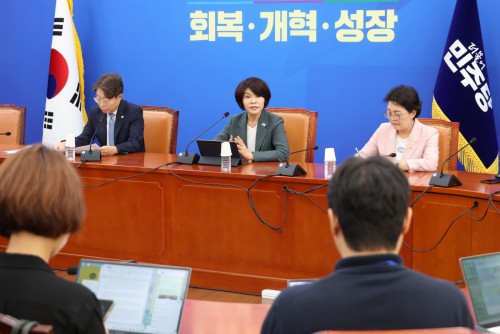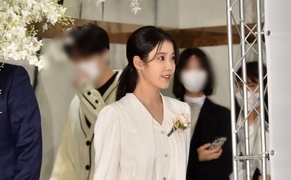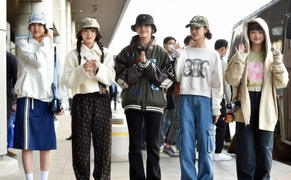 |
| Han Jeong-ae, policy chief of the ruling Democratic Party of Korea, speaks at a press briefing on government reorganization and other key issues at the National Assembly in Yeouido, Seoul, on September 14. / Source: Yonhap News |
The first round of parliamentary questioning sessions under President Lee Jae-myung’s administration is set to begin on September 15, with ruling and opposition lawmakers bracing for heated confrontations over sensitive issues including the proposed special tribunal for insurrection cases and the government’s push for three major reforms in the prosecution, judiciary, and media sectors.
According to political sources on September 14, the questioning will run through September 18, covering politics, diplomacy and security, the economy, and education, society, and culture on separate days. A total of 11 lawmakers — six from the ruling Democratic Party of Korea (DPK), four from the opposition People Power Party (PPP), and one from a minor party — are scheduled to question the prime minister and cabinet ministers. Despite the division by policy fields, observers expect wide-ranging clashes each day as the prime minister will be present throughout.
Key issues expected to dominate the exchanges include the recent mass detention of South Korean workers in Georgia, U.S.-Korea tariff negotiations, the special tribunal plan, and the legislative drive for the three reforms. The PPP is poised to criticize what it calls the government’s “one-sided dominance” and “incompetence,” while the ruling party aims to highlight the administration’s achievements and justify the reforms.
The DPK is also expected to defend its stance on judicial reform, while facing internal debate over whether to abolish prosecutors’ supplementary investigation powers. Hardliners demand their removal for “genuine reform,” but President Lee has urged caution, saying reform should not be reckless.
Economic policy will also be a focal point, with disputes anticipated over the government’s housing market regulations, its expansive fiscal policy, and the proposed amendments to the Commercial Act and the so-called “Yellow Envelope Act.” The PPP has also sharpened its criticism of the administration’s handling of U.S.-Korea trade talks, arguing that Seoul’s pledged $350 billion investment in the U.S. could strain Korea’s foreign reserves if poorly managed.
On the ruling side, DPK lawmakers close to President Lee, such as Park Sung-joon, Lee Hae-sik, and Chun Joon-ho, will take the lead in questioning. Former Unification Minister Lee In-young and ex-presidential aides are set to appear in the diplomacy and security session, while former SME Minister Kwon Chil-seung and former presidential jobs secretary Jung Tae-ho will lead the economy round.
The PPP has deployed senior lawmakers including Im Ee-ja, Shin Sung-beom, and Kwak Gyu-taek on the opening day, with Rep. Na Kyung-won, a five-term lawmaker, closing the questioning on September 18.
Most Read
-
1
-
2
-
3
-
4
-
5
-
6
-
7





















